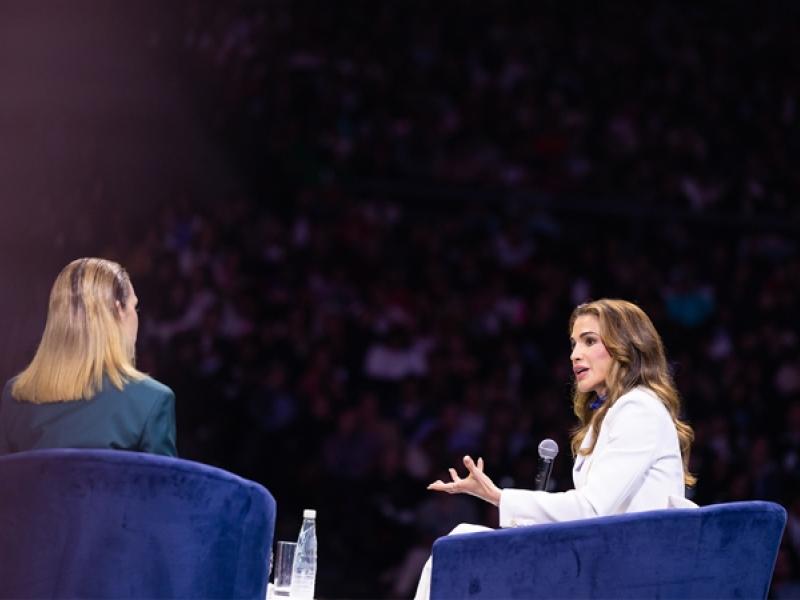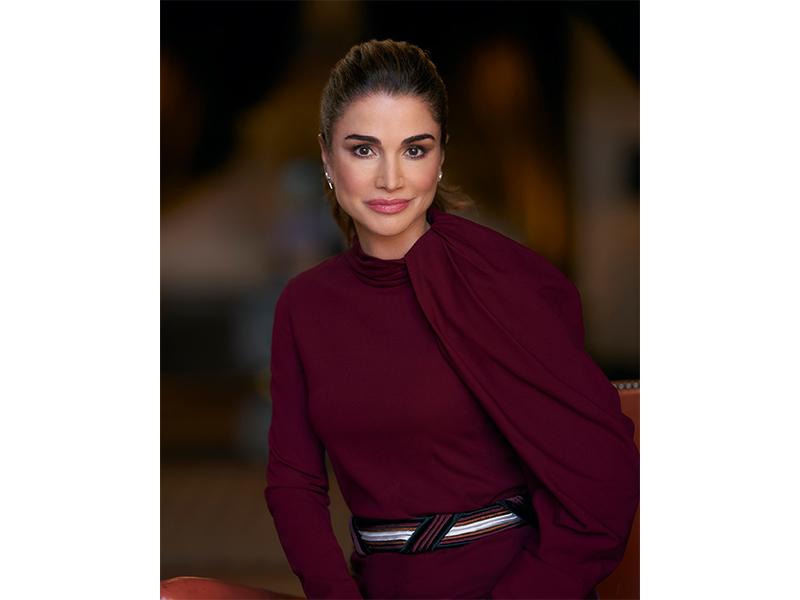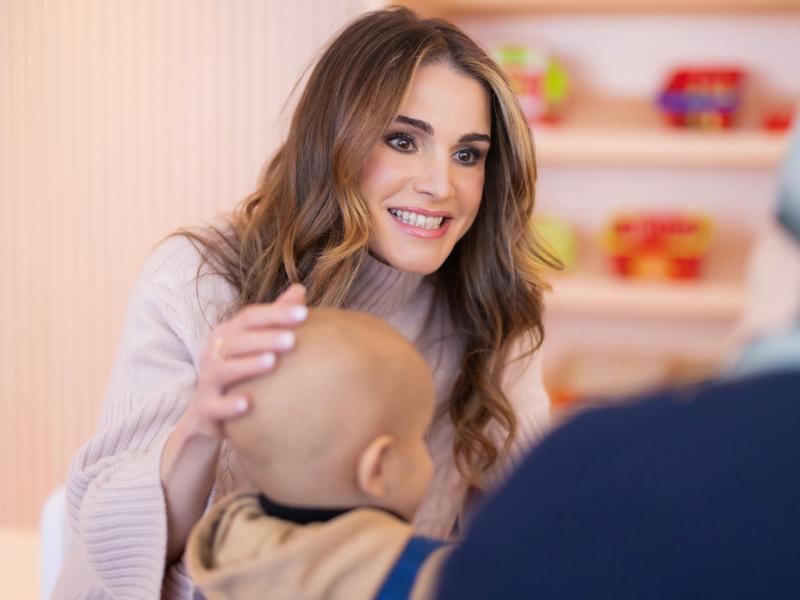Q. Your Majesty, what are your deep feelings two weeks after the Paris terrorist attacks and the historical demonstration in which you participated along with President Hollande?
I understand too well the shock, sadness and deep loss that the French people are feeling.
There is a powerful sense of disbelief and dismay when someone violates your place of work, your home, or any public space on your land and commits such crimes. I know this because, sadly, it is a daily and heartbreaking reality in so many parts of the Arab world, from Syria to Iraq, Palestine, Lebanon and elsewhere. And even though it has been over nine years, no one in Jordan will ever forget the Amman bombings. I certainly won’t. We lost 60 innocent lives that tragic day. Extremist groups have taken thousands upon thousands more innocent lives. In fact, Muslims are their primary victims.
I believe that this is a fight between moderates and extremists, not just in the Middle East, but across the world. Which is why the demonstration’s message of global unity against this ideology of hate is so important.
Q. Is there a scene, a moment that you will never forget?
I have visited France often, but never with such a heavy heart. Stepping off the plane, I felt that I had come to console and stand by friends in their moment of sorrow. Particularly since that friend has stood by us in challenging times, and at different junctures in history, not least of all in the French Parliament’s honorable stance of recognizing the Palestinian state.
There is nothing more powerful than when the world is united by one sentiment, that of unity and resilience against hatred. That is exactly what the extremists don’t want. They want to see the world divided. They want to spread fear and mistrust. That day in Paris, the world proved them wrong. And we must continue to prove them wrong.
Q. Charlie Hebdo decided to publish new caricatures of the Prophet Muhammad. How do you react to this?
I think it’s important to clarify something here. Every religion has its own set of beliefs and teachings that govern it. Some may not agree with these, but out of acknowledgment for our common humanity, we must show respect for these beliefs. In Islam, it is simply unacceptable to depict any prophet (not just Prophet Muhammad PBUH) through any medium- painting, cartoon, or sculpture, on screen and in any context- respectful, humorous, satirical or otherwise. Respecting prophets is a main tenet of our faith. Recently, a movie- Exodus: Gods and Kings for example was banned in several Arab countries because it was deemed as not showing enough respect to the stature and sanctity of the Prophet Moses. So, as a Muslim, I am against these cartoons and I am offended and hurt by the lack of respect for our beliefs. For Muslims, Prophet Mohammad (PBUH) is a messenger of God, he is a teacher, and he is our spiritual leader.
I cannot see the point or value of reducing a figure that millions of Muslims around the world hold so dear into crude caricatures. To what end? More cartoons of this sort only hurt, deepen mistrust and incite prejudice, at a time when we should be promoting tolerance and understanding. Surely there is a balance to be found between freedom of expression and protecting the dignity and sanctity of religion? And that shouldn’t be driven by fear; it should be driven by respect and empathy. I have heard since the attacks echoing grievances from my region about double standards when it comes to freedom of speech. Why is it considered freedom of speech when the subject has to do with Islam, but taboo and a red line when the issue is different?
Let me be clear, the response should never be violence. Never. People, whether Muslims or others, have every right to BE OFFENDED, to voice their rejection, to condemn, to criticize, to protest, but to do so peacefully and respectfully.
And that is exactly what Muslims did, with the exception of four individuals - the attackers and a minority who sympathize with them. And that is exactly who they are: a minority of individuals. They do not represent an entire faith. In fact, their actions are the antithesis of Islam- a religion that values the sanctity of human life above all else. And they do not represent the millions of Muslims around the world who condemn terrorism. To equate an entire religion and its followers with the actions of a minority is just wrong. To blame Islam for their actions is prejudice. 1.6 billion Muslims cannot bear collective responsibility for the actions of this minority who claim to share their faith.
Q. How do you see the Muslim presence in Western countries? A chance, an opportunity, a questioning, or a challenge?
I think it is a reality, and one that presents an opportunity. More and more, I am afraid we are seeing increasing suspicion and negative stereotypes about Arabs and Muslims in the West.
But knowing a Muslim, having a Muslim for a neighbor or colleague at work, can quickly dismantle these misconceptions. It is very easy to demonize people you don’t know, but once you have had a chance to interact with them, to share a meal or a conversation, things start to appear otherwise. Most importantly, that Muslims aren’t all that different. We want the same things, we love our children and want the best for them, we care for our neighbors, we work hard, and we look forward to weekends! Personal experiences and interactions can help blur the divisive lines of 'us and them'. That when it comes to the things that matter, we are not all that different. And of course, that goes both ways... For us to achieve this sought after reality, both sides have a responsibility: minority groups should interact and contribute positively to their surrounding environment, and countries must do the hard work of integrating minorities with full equality and respect for their culture and traditions. That our societies have become a diverse amalgam of different religions, ethnicities and cultures is a reality we can never escape in our globalized world- nations who embrace this reality and try to achieve justice and balance are more likely to live in social harmony.
Q. Do you think European Muslims could give a new definition to the relationship between faith and modernity, between faith and democracy?
I have never felt that there is a contradiction between faith and modernity, and faith is certainly not anti-democracy. In fact I think that many of the values of our faith - like equality, tolerance, forgiveness, dialogue, peace, and a reverence for learning, progress, hard work - would go a long way in addressing some of the challenges we face in the Arab world today.
For me, modernity means progress. It does not mean letting go of our identity in blind imitation of other cultures. It means being engaged with and connected and open to the rest of the world. That does not come at the expense of religion or identity. I think Jordan is an example of a country in the Middle East that is firmly rooted in our Arab and Muslim identity and yet we fully embrace modernity.
Q. More than 40 heads of state or chiefs of government were in Paris. Among them some countries that support extremist groups. How can strategic perspectives in the Middle East change?
It is not for me to comment on the policies of other countries, but, generally speaking, the threat which the Middle East as a region urgently needs to address is that of extremism, and I do not only mean religious extremism but political radicalization as well. Our goal is to ensure safety and security for our people against the violent actions of extremists AND defend the true image and values that our religion stands for and to not allow religious extremists to dominate the narrative on Islam.
Q. Your country, Jordan, is submitted to the collateral effect of the Syrian civil war. How do you see the evolution of the conflict in Syria?
Over the past few years, it has been very sad watching the alarming destruction of Syria and the heartbreaking humanitarian tragedy there. Hundreds of thousands of lives lost, and many more displaced. And yet despite the shocking facts, I fear that the world is quickly losing sight of both the human suffering in Syria, and the massive refugee burden on host countries like Jordan and Lebanon.
As you mentioned, Jordan has felt the spillover effects of the conflict. Today we are hosting over 1.3 million Syrians, that is equivalent to 20% of our population. It’s as if the entire population of Belgium moved into France. This is a tremendous burden on a country like Jordan, socially, economically and even on a security level. Jordan has always been, and will always be, a sanctuary for those fleeing insecurity and danger. But the impact of the Syrian crisis is much greater than our capacity to cope. Of course, there have been generous contributions from donors, and France has been very supportive, but a lot more still needs to be raised to support UN and other relief agencies in host countries.
Q. You were born in a Palestinian family. How can the present deadlock between the Palestinian and Israelis be broken?
One of the greatest dangers our world faces today is increased political polarization –on the one hand- and religious radicalization on the other. And strangely, they feed into one another. Many years ago, there were many who believed and made it their life’s mission to fight for a peaceful resolution to the Palestinian issue. We have watched in dismay as their numbers dwindled over the years until they were pushed to the margins, with the more radical views dominating the mainstream. This kind of dynamic may help bring about short term political victories, but adopting views that incite and feed people’s fears, and do not acknowledge the humanity and rights of an entire people cannot be in the long term strategic interest of any nation.
The two-state solution is the only solution. Otherwise, the alternative is continued suffering. If both parties don’t return to the negotiating table, and soon, to end the conflict permanently and justly, we will be talking about a fifth, sixth and seventh war on Gaza.
Q. Do you think women can contribute to peace between Israel and Palestine?
I think women can contribute to peace in all conflicts… Too many mothers have lost sons and daughters to the Palestinian-Israeli conflict. Too many girls have witnessed fathers and brothers beaten, imprisoned, or exiled. Palestinian and Israeli women have been working together for years to bring an end to the conflict. What these grassroots initiatives are calling for is a prosperous future for their children, for themselves. Through dialogue, visits, collaboration, and demonstrations, these women are building peace together.



